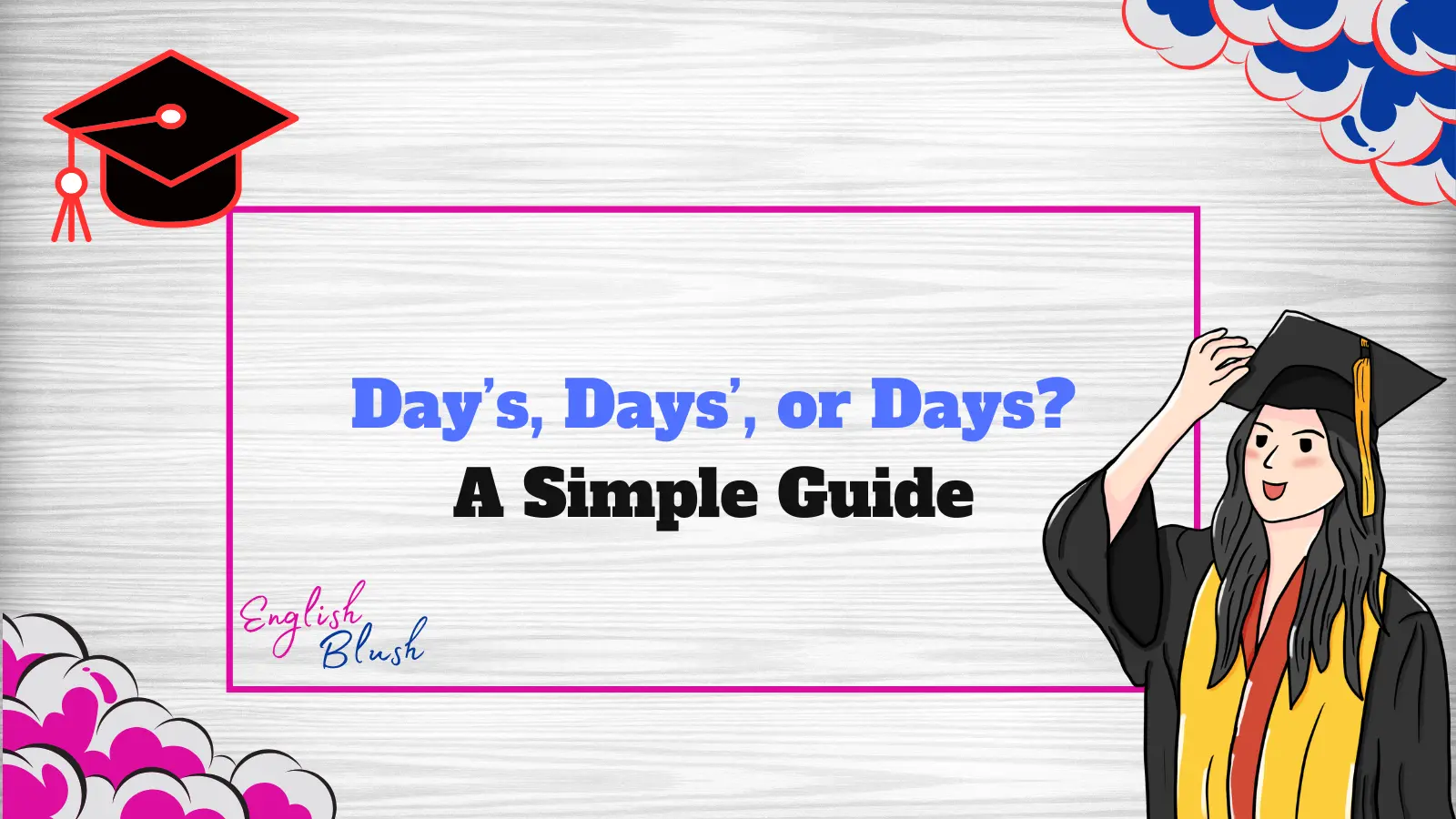Do you often get confused between day’s, days’, and days? You’re not alone! These little punctuation marks can make a big difference in meaning, but they don’t have to be tricky. Let’s break it down into simple terms. By the end of this article, you’ll know when to use each one confidently.
What’s the Difference?
Before diving in, let’s look at these three forms:
- Day’s – Singular possessive: something belongs to one day.
- Days’ – Plural possessive: something belongs to many days.
- Days – Simply plural: talking about more than one day, without ownership.
1. What Does Singular Possessive (Day’s) Mean?
When you use day’s, you are saying that something belongs to one single day. This is often used to talk about events, emotions, or things that are part of a single day.
Examples:
- Today’s weather is sunny. (The weather belongs to today.)
- A day’s work is exhausting. (The work belongs to one day.)
Think of it like giving the day an imaginary backpack to carry its belongings! The apostrophe+s (’s) shows ownership.
2. What Does Plural Possessive (Days’) Mean?
When you use days’, you’re talking about something that belongs to several days. The apostrophe goes after the s because it’s already plural!
Examples:
- The past few days’ events have been exciting. (Events belong to a group of days.)
- The seven days’ notice must be given before quitting. (The notice is for seven days.)
Here, multiple days share something in common, like their events or responsibilities.
3. What Does Plural (Days) Mean?
This is the simplest form! Days is just the plural of day. It means you’re talking about more than one day, but there’s no ownership.
Examples:
- I’ll see you in three days. (No one owns the days; we’re just counting them.)
- Summer days are long and warm. (Just talking about lots of days in summer.)
No apostrophe is needed here—it’s just the regular plural form.
Key Differences at a Glance
To make things even clearer, here’s a table to summarize:
| Form | Meaning | Use Example |
|---|---|---|
| Day’s | Singular possessive: belongs to one day. | Today’s meeting is canceled. |
| Days’ | Plural possessive: belongs to many days. | Last week’s days’ work was exhausting. |
| Days | Plural: more than one day (no ownership). | I’ll visit in five days. |
How to Remember the Rules
Here are a few tips to help you remember when to use each one:
- Look for Ownership: If something belongs to a single day, use day’s.
- Think About Plurals: If it’s about more than one day and shows possession, use days’.
- Count the Days: If you’re just counting days without any ownership, stick with days.
Common Mistakes to Avoid
It’s easy to mix these up! Let’s look at some examples of mistakes and how to fix them:
- Incorrect: I’ll need one days notice.
- Correct: I’ll need one day’s notice.
- Incorrect: Yesterday weather was cold.
- Correct: Yesterday’s weather was cold.
- Incorrect: Two day’s holidays are planned.
- Correct: Two days’ holidays are planned.
Practice Time!
Now it’s your turn to try. Which form is correct?
- Tomorrow___ forecast looks promising.
a) Days
b) Day’s
c) Days’ - The team has seven___ worth of training.
a) Day’s
b) Days
c) Days’ - They traveled for several___ across the mountains.
a) Days
b) Days’
c) Day’s
Answers to Practice
- b) Day’s (The forecast belongs to tomorrow.)
- c) Days’ (The training belongs to seven days.)
- a) Days (Simply talking about multiple days.)
Final Thoughts
Understanding day’s, days’, and days doesn’t have to be hard. Just remember:
- Day’s shows that one day owns something.
- Days’ shows that multiple days own something.
- Days is the plain plural form with no ownership.





